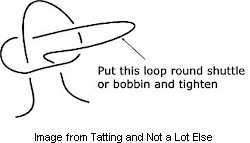 Tatting goddess Jane Eborall goes back to basics to teach us the easy way to load a shuttle. See the tute.
Tatting goddess Jane Eborall goes back to basics to teach us the easy way to load a shuttle. See the tute.
Have you read?
Free Crochet Pattern – Halloween Skull Sweater
If you’re after a sweater that makes a statement, the Red Heart Skull Sweater pattern delivers just the right mix of cozy and edgy. This isn’t your average knit—those bold skull motifs stitched right into the fabric turn a simple pullover into something with personality.
What I Loved
- Clear instructions: The pattern is laid out in a step-by-step format that feels approachable, even if you’re newer to colorwork.
- On-trend design: The skulls are playful without being cartoonish, making this sweater work for teens, young adults, or anyone with a quirky style streak.
- Yarn choice: Red Heart yarn holds up beautifully in sweaters—it’s durable, machine-washable, and budget-friendly. Perfect if you want something practical that still looks striking.
What to Watch Out For
- Colorwork challenge: If you’ve never worked with multiple strands or managed floats before, expect a little learning curve. I recommend practicing on a swatch before diving into the sweater body.
- Fit: Like many free patterns, sizing runs a bit generous. Be sure to check your gauge carefully so your skulls don’t end up stretched or squished.
- Yarn weight: Because it’s worked in worsted weight, the sweater is warm—maybe too warm for some climates. Great for autumn or winter layering though.
Overall Thoughts
The Red Heart Skull Sweater is one of those patterns that makes people stop and say, “Where did you get that?” It’s bold, fun, and gives you a chance to show off your knitting skills. I’d recommend it to confident beginners ready to try intarsia or stranded knitting, as well as seasoned knitters looking for a project with personality.
10 Crochet Skull Patterns For Halloween [Crochet]
25+ Skull Themed Quilt Patterns For Halloween [Quilting]
13 C2C Crochet Blanket Patterns Just For Halloween
